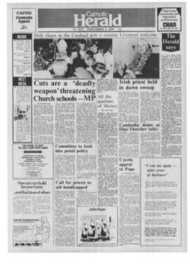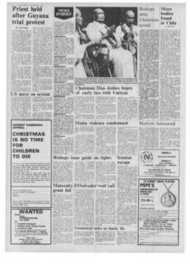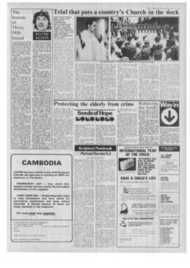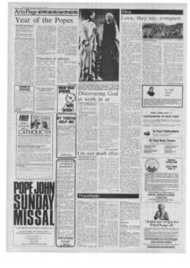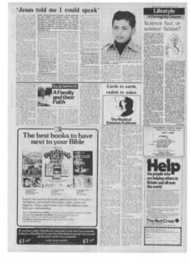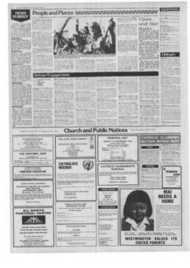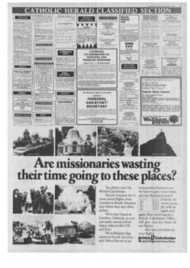Page 5, 2nd November 1979
Page 5
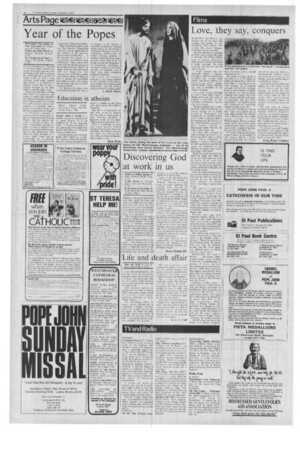
Report an error
Noticed an error on this page?If you've noticed an error in this article please click here to report it.
Tags
Share
Related articles
Brilliance Of Gone With The Wind Stays On
Cinematic Ascendancy Confirmed
Imperfect Couples
A Sure Delight For Families From Young To Old
Three Mystifying Titles
Love, they say, conquers
ROBERT ALTMAN has become one of the most vital, versatile and creative of contemporary film-makers. Few people like every Altman. Everybody has his favourite.
My own and that of a majority of critics and so-culled film buffs is Nashville, his brilliant impression of young America's music centres. On the other hand I hardly remember The Long Good-live and did not care for Three Women.
I much admired the less universally lauded A Wedding, although I could not immediately recognise the co-stars (Paul Dooley and Marta I lefflin) of A Perko Couple ("AA", Studio. Oxford Street; Odeon, Kensington, etc) as Members of that Altman Wedding.
For A Perfect Couple, although it is partly about today's type of singing. group and their style of singing, is basically an oldfashioned sentimental musical with rock descant.
The quite unglamorous couple. dated by video-computer go to a concert together, are as cruelly parted as Montagues and Capulets by his tight-knit Greek family and the commune which is her singing group. But destiny and the script lead them as surely to their happy ending as Shakespeare leads Romeo and Juliet to their tragic one.
The blind date arranged by video-computer takes them to the Hollywood Bowl where a gifted pianist (Mona Golambek) is playing a concerto. Dooley tries to follow up this first date, but the couple are frustrated by the different disciplines under which surprisingly both labour.
Inside the Greek household the autocratic father can refuse to excuse his middle-aged son from the family dinner table and demand to know his every move outside. The girl works under the zealous professional discipline of her singing group.
When he rashly takes her home and into his bed the entire family burst into the bedroom, insult her and turn her out. She calls his family "weirdos": the Greeks have a more basic English word for her.
The film is as musically motivated as Nashville was, though by different music: "Love is all there is", "Come into my fantasy" and so forth. As far as I can judge, this is sweet rock, 1980, and in the end love triumphs as surely over family tradition and professional zealotry as ever it did to Victorian ballads or to AstaireRogers taps.
Sixteen years ago Zulu launched Stanley Baker as a producer and made Michael Caine a star. It was a reasonably successful return to the BOP type of adventure story remembered at its patriotic, flag-wagging best in The Four Feathery.
Now arrives Zulu Dawn ("A", Classic. Haymarket) as what has come to be horridly called a "prequel". This is the story of the British defeat before the official Zulu war, what the publicity proudly calls the "worst defeat ever inflicted upon the British army by a native army."
Superficially, the form is familiar — red-coated, whitetopped soldiers, scores of them to one lady at a garden-party, to hordes of black warriors brandishing spears on the horizon. But this is 1980. What used to be flag-wagging patriotism has been turned into the beating of western breasts, by the Americans over Vietnam and by the British media over our Empire,
Numerous excellent actors — Peter Oloole as Lord Chelmsford, the British commander at Isandhlwana; Burt Lancaster, as Colonel Durnford, the experienced veteran who, being dead at the end can be blamed for the defeat; John Mills, as the High Commissioner; Simon Ward. as William Vereker, the proverbial hero playing the fop: the excellent Nigel Davenport, as the tough colonel with a heart of gold for his native soldiers; Ronald Lacey, as "Noggs" Norris Newman, the ruthless reporter — and still others get lost in the crowd. It is difficult to identify them, for there is little enough characterisation.
The model for Zulu Dawn is not really the A. E. W. Mason or Kipling tradition. It is rather the newer film of The Charge of the Light Brigade. In our present national decline the defeatist mood in entertainment is hardly stimulating or encouraging. Although our history may have been punctuated with such cases of ineptitude, had they been characteristic we could scarcely have maintained our world-wide Empire as long as we did.
Each film by Liliana Cavani 'that I have seen strikes me as more objectionable than the last (with a breather for one crudely
pagan cruise in t he Mediterranean). She has a certain surface style, but in her latest movie the only thing 1 can find to repect is the candour of the title, Beyond Eri/ ("X", Plaza 3), This year's (23rd) London Film Festival opens on November 15 with Camera Buff by a Polish director. Kieslowski, new to me: and on the same day there is a Czech osl osak comedy, These Wtntelernil M,hie Cranks, by Jiri Menzel. probably the best-known Czechoslovak director.
Looking through the titles does suggest that the theme of this year's festival may he filmmaking. As usual, the time element prevents my seeing the early festival films in time to review them. beyond noting obvious attractions unseen and hoping to review them in my next article,
My own pick of unseen attractions in the first week would include Fellini's Orchestra rehearsal: I he National Shotgun, by the Spanish director Berlanga; Erik Rohmer's Perceral of Wales (the English Parsifal); and It's A Mean Old World, which sounds a fascinating documentary.
The festival runs until Sunday, December 3. All inquiries to the London Film Festival box office, the National Film Theatre, South Bank, London SEI 8XT.
Freda Bruce Lockhart
blog comments powered by Disqus


